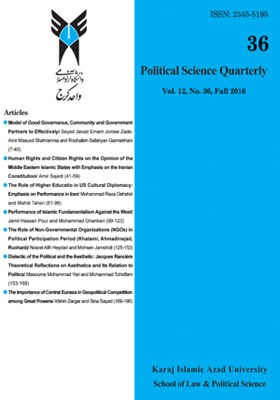Human Rights and Citizen Rights on the Opinion of the Middle Eastern Islamic States with Emphasis on the Iranian Constitution
Subject Areas : Cunstitiuation
1 - Assiastant Prof. of International Relations Group, Central Tehran Baranch, Iran, Tehran
Keywords: Human Rights, Citizen Rights, Human Rights Declaration, Middle Eastern States,
Abstract :
Human rights and Citizen Rights are both derived from natural and inherent rights of all people and historically have been uniquely addressed among the various world thinkers and by the various schools of religious thought. It is unfortunately true however that until the end of the Second World War the idea of human rights did not find a place in a wider arena of thought. Although with the declaration of human rights in 1948 and owing to other related conventions, human rights became a world-wide phenomena and many governments in the Middle-East still have not accepted all its clauses. These governments having stated that some aspects of the world human right laws are at odds with the Koranic teachings balk at carrying out their duties with respect to human and citizen rights. Citizen’s rights are those class of people’s rights which are given as national rights according to the constitution of relevant countries and as such cover only the citizens of the relevant nations. The passage of the constitution of the I.R.I encompassing sections 19, 23, 24, 26, 32, 47, ... which had contained the equal rights and citizen’s rights had generated great hope that the people of Iran will again after much time regain their human rights and citizen’s rights. The manner that these rights are accepted and are made to coexist with the Sharia and the way the populace of the nations in the Middle East are taught and informed on their quest for human rights and citizen’s rights are among the most noteworthy guides of their governments in carrying out its relevant duties.
منابع فارسی
- آقایی، بهمن (1376)، فرهنگ حقوق بشر، تهران: کتابخانه گنج دانش.
- احمدی، حمید (1388)، بنیادهای هویت ملی ایرانی، چهارچوب نظری هویت ملی شهروند محور، تهران: پژوهشکده مطالعات فرهنگی و اجتماعی.
- اعلامیه حقوق بشر وین و برنامه عمل، در: http://www.pajoohe.irVienna-Declaration-of-human-rights-and-programme-of-Action
- پللو، روبر (1370)، شهروند و دولت، ترجمه ابوالفضل قاضی، تهران: انتشارات دانشگاه تهران.
- توسلیرکنآبادی، مجید و مختار نوری (1395)، «جامعهشناسی تاریخی عدم شکلگیری حقوق شهروندی در گفتمانهای سیاسی معاصر ایران»، فصلنامه مطالعات سیاسی، سال هشتم، شماره 31.
- جنیدی، فریدون (1378)، حقوق بشر در جهان امروز و حقوق بشر در ایران باستان، تهران: انتشارات بلخ.
- خانلری، عبدالرضا ( 1384)، مجموعه قوانین و مقررات حقوق شهروندی، قم: نگین.
- خبرگزاری مهر (1392)، «برابری انسانها از دید اسلام: دوازده اصل تساوی افراد در قرآن»، 21 مرداد ، در: http://www.mehrnews.com/news/2113881
- ذاکریان، مهدی (1395)، «جهان شمولی حقوق بشر در نظام نوین بینالمللی»، فصلنامه امام صادق (ع)، شماره 8، در: http://www.hawzah.net/fa/Article/View/81098
- ساجدی، امیر (1394)، «جایگاه و کارویژههای سکولاریسم در غرب و جهان اسلام»، فصلنامه تخصصی علوم سیاسی، سال یازدهم، شماره 31.
- شبرنگ، محمد (1382)، منشور سازمان ملل متحد، اعلامیه حقوق بشر، تهران: دانشور.
- شیبانی، ملیحه (1381)، «شهروندی و رفاه اجتماعی»، فصلنامه رفاه اجتماعی، سال اول، شماره 4.
- صباغپور، علی اصغر (1381)، « جهانی شدن، حاکمیت ملی و تنوع قومی در ایران»، فصلنامه مطالعات ملی، سال سوم، شماره 11، صص 5-154.
- ضیائی بیگدلی، محمد رضا (1363)، حقوق بینالملل عمومی، تهران: رشدیه، چاپ دوم.
- ضیایی بیگدلی، محمدرضا (بیتا)، حقوق بینالمللی عمومی، بی جا.
- طلوعی، محمود (1372)، فرهنگ جامع سیاسی، تهران: نشر علم.
- قاریسیدفاطمی، سیدمحمد (1390)، حقوق بشر در جهان معاصر، تهران: شهر دانش، چاپ سوم.
- قاضی، ابوالفضل (1384)، بایستههای حقوق اساسی، تهران: میزان، چاپ نوزدهم.
- کریک، برنارد (1387)، دموکراسی، ترجمه پویا ایمانی، تهران: نشر مرکز.
- کمیسیون مستقل حقوق بشر افغانستان، در: http://www.aihrc.org.af/home/document/738
- گروه دیدگاه حوزه اقتصاد و حقوق (1391)، 24 مهر، در: http://www.fina.ir
- لوین، لیا (1377)، پرسش و پاسخ در باره حقوق بشر، ترجمه محمد جعفر پوینده، تهران: نشر قطره. . - منشور حقوق شهروندی جمهوری اسلامی، 1383.
- منوچهری، عباس و جعفری، فیروز (1393)، « تاثیر جهانی شدن بر حقوق شهروندی در ایران»، دو فصلنامه علمی-پژوهشی، شماره 16، صص 7-136.
- مورژن، ژاک (1380)، حقوق بشر، ترجمه احمد نقیب زاده، تهران: انتشارات دانشکده حقوق و علوم سیاسی دانشگاه تهران.
- مهرپور، حسین (1392)، نظام بینالمللی حقوق بشر، تهران: انتشارات اطلاعات، چاپ پنجم.
- والاس، ربکا ( 1382)، حقوق بینالملل، تهران: شهر دانش.
- هکی، فرشید (1389)، گفتمان حقوق بشر برای همه، تهران: موسئسه مطالعات و پژوهشهای حقوقی شهر دانش.
- یحیایی، فرید (1380)، فرآیند گذار و موانع توسعه دموکراسی در ایران، تبریز: مولف.
English Source
Donnelly, Jack (1989), Universal Human Rights in Theory and Practice, Part II, Ithaca, Corner University Press
_||_
